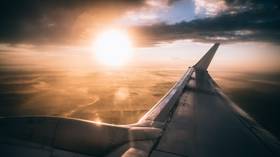Get ready to pay more for airline tickets as new aviation fuel tax looms

The European Commission is considering aviation fuel tax that is supposed to reduce carbon emissions by 11 percent and have a “negligible” impact on jobs and the economy. But experts say that it will have far-reaching effects.
According to a leaked EC report, taxing aviation kerosene sold in Europe would cut aviation emissions by 16.4 million metric tons of CO2 a year. It said that applying a tax of €330 per 1,000 liters of kerosene (which is the EU's minimum excise duty rate for the fuel) would result in a ticket price increase of 10 percent and an 11 percent decrease in passenger numbers. It would also lead to an 11 percent fall in carbon emissions.
Imposing the tax could certainly lead to a reduction of flights that will result in cuts of airlines’ staff, said Elmar Giemulla, a leading expert on air and traffic law at Berlin University of Technology’s Institute of Aeronautics and Astronautics. He told RT that nobody, however, could calculate the exact numbers, saying “that’s just speculation.”
Also on rt.com Sweden introduces aviation tax in effort to help climateAirlines are very sensitive to fuel price because it affects their entire operation, explained another aviation security expert Jacques Astre. He said that the level of the tax increase will indicate “whether they increase ticket prices which falls on the customers and will affect passenger transportation in terms of numbers.”
“So, it really depends on how high the tax is because it has a far-reaching effect, not just on the airlines directly but on passengers as well,” Astre explained.
Taxing aviation at EU level, specifically fuel and VAT on all, particularly tickets, has become a major topic of debate in Europe lately. Statistics showed that passenger traffic across the European airport network grew by more than six percent last year, bringing the total number of passengers using Europe’s airports to a new record of 2.34 billion.
“If the target of this approach [aviation tax – Ed.] is to decrease the number of passengers then they have a good chance to do so,” said Giemulla. According to him, such a move would definitely put a lot of pressure on the aviation industry. It would require a change of all bilateral agreements as it contradicts the 1994 Chicago Convention which prevents taxes on aircraft fuel. That can’t be made overnight, it would require time, he said.
Also on rt.com Air travel to get greener as tickets to get pricierThe expert reminded that the contribution of aviation to carbon emissions is just around three percent of all carbon emission. So, if anybody, including the EC would like to reduce carbon emission, he said, there are many other areas of the economy that should be taxed as well.
“It’s easy for the general public to be aggressive against aviation because for many people aviation is still a symbol of rich people who can afford flying which is silly because the increase of aviation has shown that all levels of society have the possibility to fly,” Giemulla said.
He added that aviation is a general mode of transport similar to the automobile sector with the difference that the automobile sector contributes much more to carbon emissions. “So, if anything should be done to reduce carbon emissions there are many other areas that should be taxed first,” said the expert.
For more stories on economy & finance visit RT's business section













